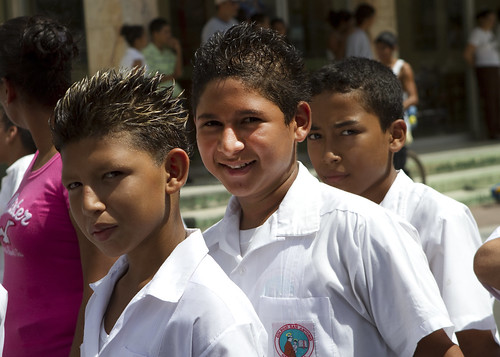 Each year, approximately 3.6 million children in Central America drop out of school or are forced to repeat a grade. Widespread gang violence in the region significantly contributes to this statistic. For this reason, governments, schools, community leaders, and school officials have introduced programs to teach children basic humanitarian principles on the value of human life.
Each year, approximately 3.6 million children in Central America drop out of school or are forced to repeat a grade. Widespread gang violence in the region significantly contributes to this statistic. For this reason, governments, schools, community leaders, and school officials have introduced programs to teach children basic humanitarian principles on the value of human life.
In Honduras, the Department of Education joined with the International Committee of the Red Cross to create the program Creating Humanitarian Spaces, which teaches respect for human life, tolerance, and the value of education to students, teachers and the broader community.
The government of Belize introduced violence prevention programs that support positive development skills through role play and games. In El Salvador, the National Sports Institute trained police officers in the use of sports to teach similar values to school-age children. Similarly, soccer programs in Panama help keep children in school while teaching strategies for avoiding violence and drugs.
Earlier this year, UNICEF and the Central American organization CECC/SICA jointly released a report entitled Finishing School in Central America: The Pending Challenges, that highlighted the dropout and repeating problem in the region. Throughout Central America, 33% of primary school students and 69% of high school students either repeat a grade or drop out altogether. Nicaragua and Honduras have the worst retention rates of the countries surveyed with only 44% of primary school students completing their studies.
“Countries in the region will not achieve the full realization of the right to education for all children and adolescents if they don’t take consistent, coherent, and sustained measures to improve the quality of education, reduce repetition and drop out,” according to Bernt, Aasen, UNICEF Regional Director for Latin America and the Caribbean.
Gang violence has increasingly become a part of many communities throughout Central America, introducing a culture of violence and fear that affects people of all ages. Students, teachers and bus drivers are often required to pay protection money to the gangs to ensure their safety. Those who do not pay may be killed. Children in these areas also grow up afraid to leave their homes, go to school or play outside. Others are recruited at young ages to become members of youth gangs. As a result, many children in these countries witness or become the victims of beatings, kidnappings and killings.
Creative Commons Love: David Dennis on Flickr.com

















